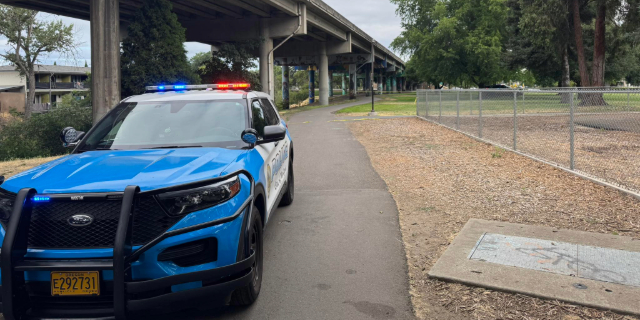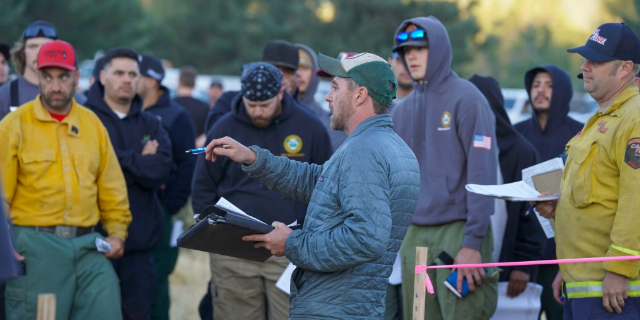Bend homeless man is without a house, not a home
Published 4:30 am Sunday, May 22, 2022

- faces of homelessness
Michael Parker doesn’t consider himself homeless.
Trending
Instead, he considers himself houseless because he does not live in a structure most people would consider a house.
Parker, 46, is one of dozens if not hundreds who live in the wilderness off China Hat Road in Bend. He said he goes by the nickname “Rev,” because he considers himself a reverend of a religion he refers to as “Parkerism.” The basic tenets: Don’t be rude and stay happy.
He lives under an intricate setup of tarp and trailer.
Trending
Inside, he has made an insulated fireplace out of scrap metal and rocks to stay warm and as a way to reduce fire danger.
The tarp, which is hung beneath two trees and serves as the walls of his home, is adorned with art.
Perhaps not a house, but definitely his home, Parker said.
Due to a variety of mental and physical disabilities, living in a traditional house or apartment is difficult and feels like confinement, he said.
“I like to be able to pick up and move in 25 minutes,” Parker said.
For the last 15 years or so, Parker has been in Central Oregon and living outside in some capacity.
Parker doesn’t remember what exactly brought him to Central Oregon, other than he enjoys the cold nights and warm days the High Desert climate provides.
He has lived at several camps in Bend, including the camp that was cleared by the Oregon Department of Transportation off Revere Avenue last year.
Parker moved to China Hat Road roughly six months ago because he thought it would be a better place for his dog to have puppies.
Before coming to Central Oregon, Parker said he lived in Chicago. He used to be a chef and, at one point, owned a house, Parker said.
“I like to eat. I’ve always been into food,” Parker said. “But it got too hard to do.”
In the past, Parker said he has been told he has dissociative identity disorder, more commonly known as multiple personality disorder, and ADHD, because he hears voices and can’t concentrate.
He said he doesn’t agree with those assessments from professional behavioral health workers.
Parker’s only income comes from donations from nonprofits and individuals. He has tried to apply for disability in the past but finds it difficult to focus long enough to complete it.
“I get frustrated, and then I give up,” he said.
When asked what he would say to the people who may judge the way he lives, Parker suggested people shouldn’t judge in the first place.
“If you don’t like it, don’t look,” Parker said.
Parker represents a subset of the Central Oregon homeless population who choose to live outdoors, said Colleen Thomas, Deschutes County’s homeless outreach coordinator.
Thomas said it is important to remember every person’s reasons for becoming houseless are personal, but in general that in her work she has rarely seen someone start off wanting to live outside.
There are usually several factors, like someone getting fatigued hitting barrier after barrier or a consistent experience hitting red tape, she said.
People can become discouraged when they attempt to use resources, like a shelter, but are met with staff that is not trained enough to handle a mental illness-related episode, and so they get trespassed.
It can lead to people becoming isolated, and an easier response is to choose to live outside of society because when they do try to engage in resources, they have negative experiences where they feel punished, Thomas said.
Instead of asking why someone doesn’t want to live inside, advocates need to consider what led them to that response, Thomas said.
“How is the system on a large scale been unable to support that individual in maintaining some sense of stability?” Thomas said.
Thomas said for some people, it might take months or years to get more comfortable in a community setting, and it’s important to consistently meet people where they are at to address their needs.
“Having the consistency of following up and following through goes further than we ever know,” she said.
Who are the real people impacted by skyrocketing housing prices, decisions about homeless shelters or plans to sweep informal camps? The Bulletin wants to offer insight by telling their stories through the series Faces of Homelessness. Every two weeks this year, Bulletin reporters will introduce readers to a different homeless person. We are here to tell their stories.
For suggestions on how to help the region’s residents experiencing homelessness, contact the Homeless Leadership Coalition by email at info@cohomeless.org.









